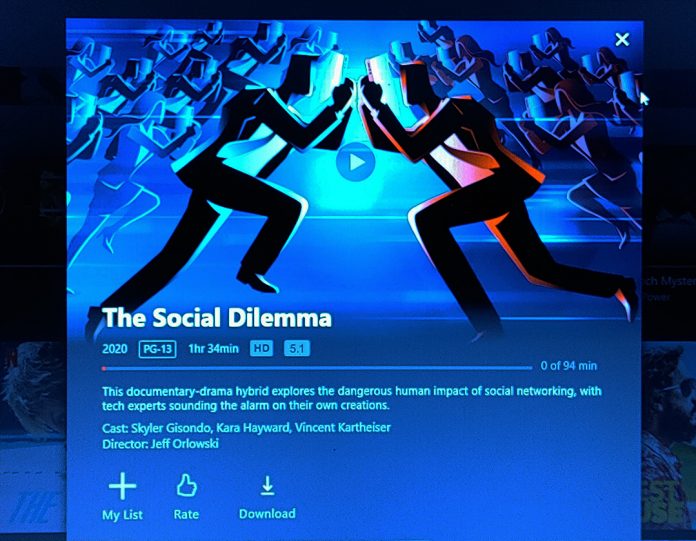Some things are ‘so 2020’ but the memorable American docudrama film on Netflix, The Social Dilemma, directed by Jeff Orlowski, released Jan. 26, 2020, is still the film to watch this year.
The Social Dilemma is worth watching in 2021 because it explains the link between social media and mental health, as well as the link between social media and the decline of democracy; the film consequentially reveals society’s increasing addiction to social media, and as a result, will make people want to take back control of their lives.
The biggest reveal though is that life should be complemented by social media and our online presence, not replaced by it.
However, because of COVID-19 and lockdowns, the world is facing uncertain times. People have had no other choice but to adapt to an online approach to continue with everyday necessities such as social lives, school and work.
With social distancing, now a global normality, there is a need to stay mindful of the message The Social Dilemma is telling us all in 2021.
Mental Health and Social Media
While our online activity increases in lockdown, The Social Dilemma explains the decline in mental health and the devastating link it has to what’s going on behind our screens by breaking down how strong the link is between social media and society’s decline in mental health.
Engineers and executives who have worked for Twitter, Pinterest, Facebook, Google, Apple, and other social networking companies, but who have now decided for ethical and other reasons, to talk about their feelings of guilt and the harm they inflicted on society while they worked for these networking companies.
The Social Dilemma dives in on topics such as youth mental health highlighting fake popularity, and Snapchat/filter and body dysmorphia in teens, especially girls – all in response to the unrealistic standards of beauty portrayed by social media.
The film further explains the link between social media and degrading mental health by explaining the never-ending search for online approval that, “starts to dig deeper down into the brain stem and take over kids’ sense of self-worth and identity,” according to Tristan Harris, a former Google design ethicist and co-founder of the Center for Humane Technology.
Come to Terms with Addiction
Some people may think they aren’t addicted to social media or are able to control themselves but The Social Dilemma highlights what some experts have said about social media forcing viewers to reassess the possibility.
“Do you check your smartphone before you pee in the morning or while you’re peeing in the morning? Because those are the only two options,” asks Roger McNamee, an early investor in Facebook.
As Edward R Tufte, a computer scientist and a professor emeritus of computer science, political science, and statistics at Yale University said, “There are only two industries that call their customers ‘users’: illegal drugs and software.”
From the colour of the chat screen to how much a notification shows on the home screen, everything has been designed for a purpose to keep our attention on the screen – for as long as possible.
We are being programmed by these platforms to scroll down our newsfeeds and scroll away our lives, health and confidence.
The film portrays how addicted a teen boy has become to social media through a fictional reenactment of his everyday life, which is a necessary way to visualize and explain how social networking industries treat their users like lab rats.
Every choice and action made by Ben on his cellphone is rewarded by each of the three lab experimenters controlling his phone in the reenactment. In Ben’s case, it’s dopamine highs every time he gets a like, a thumbs up, or if he is tagged or notified, all of which benefits the lab experimenters because they get his undivided attention.
Everyone is guilty of picking their phones up and getting sucked into social media’s quicksand, losing track of the time spent scrolling. The Social Dilemma may be alarming but it will also help many people come to terms with their increasing addiction to social media in 2021.
Take Control
After watching The Social Dilemma, there’s a possibility many may want to reassess their entire lives. Some will want to be more present offline and maybe even lessen the number of accounts and apps.
Through expert interviews, The Social Dilemma proved social media is designed in a way that is not ethical and harmful to its users proving social media should be controlled to complement rather than replace our social lives.
Social media can be a wonderful tool helping to reunite family, or chat with a friend in another country but after watching The Social Dilemma, it becomes clear how critical it is to become mindful of social networking technology and the impact it can have.




